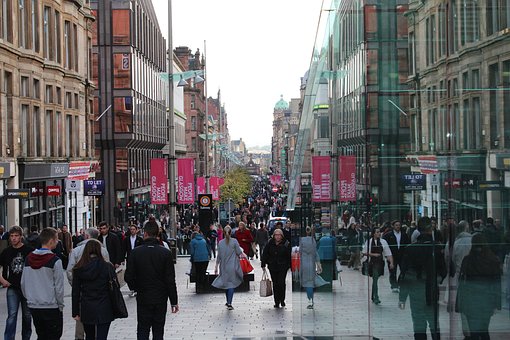Summer sales fail to lift retail gloom
In the five weeks 26 May – 29 June 2019 Scottish sales decreased by 3.1 per cent on a like-for-like basis compared with June 2018, when they had increased by 2.0 per cent. This is below the 3-month average decrease of 1.0 per cent.

According to the latest KPMG and Scottish Retail Consortium data, total sales in Scotland decreased by 2.3 per cent compared with June 2018, when they had increased by 2.7 per cent. This is below the 3-month average decline of 0.5 per cent and the 12-month average flat 0.0 per cent. Adjusted for inflation measured at 0.1 per cent by the BRC-Nielsen Shop Price Index (SPI), June sales decreased 2.2 per cent.
Total Food sales increased 0.8 per cent versus June 2018, when they had increased by 4.8 per cent. This is below both the 3-month and the 12-month averages of 3.1 per cent and 2.9 per cent respectively. The 3-month and 12-month averages are above the UK’s levels of 2.4 per cent and 2.2 per cent respectively.
Total Non-Food sales decreased by 4.8 per cent in June compared to June 2018, when they had increased by 1.0 per cent. This is below both the 3-month and 12-month averages of -3.5 per cent and -2.3 per cent respectively.
Adjusted for the estimated effect of Online sales, Total Non-Food sales decreased by 3.4 per cent in June versus June 2018, when they had increased by 2.7 per cent. On a 3-month basis, the Online-adjusted Total Non-Food sales decreased 2.4 per cent, below the UK Non-Food average of -2.1 per cent.
Ewan MacDonald Russell, head of policy & external affairs at Scottish Retail Consortium, said: “Another difficult month for retailers as sales struggle to match the heights of last summer. A real-terms fall of 2.2 per cent is very troubling for the industry at a time of year when consumers should be feeling more optimistic. However, all the evidence shows consumers are restricting their discretionary spending, only targeting products they require right now.
“Food sales continue to slide, with a real-terms fall this month once inflation is stripped out. There is also evidence consumer trends are very different this year, with shoppers swapping frozen and barbecue food for more warming alternatives. Non-food also saw this phenomenon, with home products outperforming last year at the expense of outdoor goods. Fashion sales continue to be quite poor, however, with retailers reporting even discounted products under-performing expectations.
“There is a clear trend in recent months of a slowdown in consumer spending. The SRC remains concerned the intense political and economic volatility, along with the prospect of further costs resulting from government policy, is discouraging consumption. The consequence of the unending Brexit gridlock and stagnation is reduced confidence amongst retailers and consumers - which can only reduce overall growth. A resolution which protects the friction and tariff free trade the retail industry depends upon is urgently needed; along with renewed domestic policy measures to stimulate supply-side growth.”
Paul Martin, UK head of retail at KPMG, said: “The latest figures provide further evidence that growing economic and political uncertainty is taking its toll on Scotland’s high streets. With like-for-like sales falling 3.1% compared to last year, the rate of decline isn’t quite as sharp as what we witnessed in May, but the overall picture offers little optimism for a sector that’s already facing wide-ranging challenges.
“While non-food sales fell victim to the largest dip, food retailers are far from immune from the difficult trading conditions, with another flat performance. The rate of decline across the sector is now outpacing the rest of the UK. With signs that trend could be set to continue, the coming months could be particularly difficult for the industry. Focussing on cost efficiencies whilst rethinking growth opportunities remains pivotal.”





